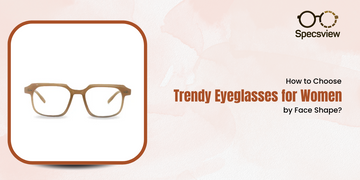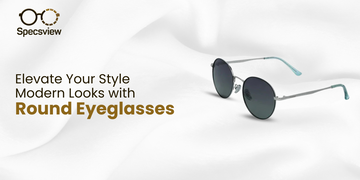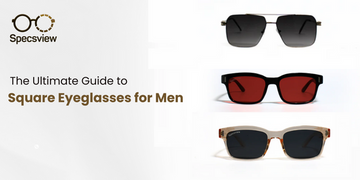It's not difficult to learn how to clean and take care of contact lenses, but it does require patience. Setting up a routine for cleaning and disinfecting your lenses is the best method of keeping your eyes healthy and happy by using reusable contact lenses.
There is a risk of contracting serious eye infections If you don't wash or disinfect the contact lenses appropriately. Follow your eye health professional's instructions regarding the contact lenses.
How to Clean Your Contact Lenses
Cleaning and Storing
- Wash your hands thoroughly: Use warm water and antibacterial soap to remove any dirt, oil, or debris from your hands. Dry them completely with a lint-free towel before touching your lenses.
- Clean your lenses: Follow the instructions on your contact lens solution bottle. Most solutions recommend a "rub and rinse" method. Place a few drops of solution on your clean palm, gently rub the lens with your index finger, and rinse both sides with fresh solution.

- Never use tap water: Tap water can harbor bacteria and parasites that can cause serious eye infections. Always use a fresh contact lens solution for cleaning and storing.
- Store your lenses properly: Empty the old solution from your lens case and rinse it thoroughly with fresh solution. Leave the case open to air dry completely. Once dry, fill the case with fresh solution and place your clean lenses inside.
- Replace your lens case regularly: Most experts recommend replacing your lens case every 3 months to prevent bacteria buildup.
Wearing and Removing
- Always handle lenses with care: Avoid touching the lens itself with your fingernails. Pinch the lens gently with your thumb and index finger.
- Put lenses in the correct eye: It's easy to accidentally switch lenses. Make a habit of putting the right lens in first every time.

- Remove lenses before applying makeup or sleeping: Apply eye makeup and remove it after taking out your lenses. Sleeping with contact lenses in (unless you have extended-wear lenses) can increase your risk of infection.
- Follow the recommended wearing schedule: Don't wear your lenses for longer than recommended by your doctor. Daily-wear lenses should be discarded at the end of the day, while extended-wear lenses may require a specific cleaning routine.
Additional Tips
- See your eye doctor regularly: Schedule regular eye exams with your doctor to check the health of your eyes and ensure your contact lens prescription is up-to-date.
- Don't swim or shower with lenses: Unless you have special water-resistant lenses, avoid swimming, showering, or using hot tubs while wearing contact lenses.
- Don't use expired solutions: Always use fresh contact lens solutions and dispose of expired solutions according to the instructions.
- Discontinue use if your eyes are irritated: If you experience any redness, burning, or discomfort, remove your lenses immediately and consult your eye doctor.
By following these tips, you can help ensure your contact lenses are clean, comfortable, and safe for your eyes.
What Causes Eye Irritation?
Eye irritation can be caused by a variety of factors, ranging from mild irritants to more serious underlying conditions. Here are some of the most common culprits:
- Dry Eyes: This is a common cause of eye irritation, especially with increased screen time or dry environments. Symptoms include scratchiness, redness, burning, and a feeling of something being "in" your eye.
- Allergies: Seasonal allergies or allergies to dust, pet dander, makeup, or other airborne particles can cause itchy, watery eyes, redness, and puffiness.
- Foreign Objects: Sand, dust, eyelashes, or other tiny particles can get lodged in your eye, causing irritation, watering, and discomfort.

- Contact Lens Discomfort: Improper lens care, wearing lenses for too long, or not following the recommended replacement schedule can irritate your eyes.
- Irritants in the Air: Smoke (cigarettes, bonfires), chlorine in swimming pools, strong fumes, or harsh chemicals can irritate your eyes, causing redness, tearing, and burning.
- Eye Strain: Staring at screens for long periods, bright lights, or poor lighting conditions can cause eye fatigue and irritation, leading to redness, blurry vision, and headaches.
- Eye Infections: Bacterial, viral, or fungal infections can cause a variety of symptoms including redness, swelling, pain, discharge, and light sensitivity.
- Blepharitis: This is an inflammation of the eyelids that can cause redness, irritation, crusting of the eyelashes, and even styes.
-
Pink Eye (Conjunctivitis): This highly contagious viral or bacterial infection causes redness, watering, itching, and a gritty feeling in the eye(s).
Suppose your eye irritation is severe, persistent, or accompanied by other symptoms like vision changes, pain, or discharge. In that case, it's important to see an eye doctor to determine the cause and get proper treatment.
More useful tips to help your day-to-day life
Contact Lenses and Makeup
-
Apply makeup after inserting lenses: This prevents makeup particles from getting trapped under your lens and irritating your eyes.
-
Use oil-free products: Oil-based products can break down the lens material and blur your vision. Opt for oil-free makeup specifically formulated for contact lens wearers.
- Avoid eyeliner on the waterline: This is the inner rim of your eyelid closest to your eye. Applying eyeliner here increases the risk of particles getting trapped under your lens and causing irritation.

-
Use a gentle touch: Be gentle when applying and removing makeup around your eyes to avoid dislodging your lenses.
-
Clean your makeup brushes regularly: Bacteria buildup on makeup brushes can be transferred to your eyes and lenses, increasing the risk of infection. Wash your brushes weekly with a gentle cleanser and warm water.
- Remove all makeup before taking out lenses: This helps prevent makeup particles from transferring to your lenses and contaminating your lens solution.
Contact Lenses and Digital Screens
-
Take breaks often: Look away from the screen every 20 minutes for 20 seconds to give your eyes a break. This helps reduce eye strain and dryness.
-
Use artificial tears: Blink more frequently while using digital devices. Artificial tears can also be helpful to keep your eyes moist if they feel dry or irritated.
- Adjust screen brightness and contrast: Reduce screen brightness and adjust contrast to a comfortable level for your eyes.

- Night mode settings: Use built-in night mode settings on your devices. These settings reduce blue light emissions which can contribute to eye strain.
- Consider computer glasses: If you experience significant eye strain or headaches while using digital devices, consider consulting your eye doctor about computer glasses. These glasses have special lenses that can help reduce eye fatigue.
Contact Lenses and Traveling
-
Pack enough solution: Pack enough contact lens solution for the entire duration of your trip, taking into account your daily cleaning routine and potential delays.
-
Travel-sized containers: Consider using travel-sized containers as a solution, especially if you're traveling with carry-on luggage only. Check airline restrictions for liquid allowances.
-
Lens case hygiene: Bring an extra lens case and disinfect both cases regularly while traveling.
-
Bring a backup pair of eyeglasses: Pack a backup pair of eyeglasses in case of emergencies or unexpected situations where you may need to remove your lenses.
-
Avoid swimming with lenses: Unless you have special water-resistant lenses, avoid swimming, showering, or using hot tubs while wearing contact lenses.
- Be aware of time zone changes: If your travel involves significant time zone changes, discuss with your eye doctor how this might affect your contact lens-wearing schedule.

Frequently Asked Questions
Q. Can 14-15 year olds wear contact lenses?
Yes, 14-15-year-olds can potentially wear contacts, but only with an eye doctor's approval. The doctor will assess their eye health, maturity, and ability to follow proper hygiene routines to ensure safe and successful contact lens wear.
Q. Do contact lenses expire?
Yes, contact lenses do expire, and eye care experts advise using them before the expiration date. This date is typically printed on the box or blister pack, often next to an hourglass symbol or the abbreviation "EXP." It can be formatted as either YYYY-MM or 2025-08.
Q. How do contact lenses work?
Contact lenses are thin, round lenses that sit on the surface of your eyes to improve your vision. Similar to glasses, contact lenses correct refractive errors, which are alterations in the shape of your eye that prevent light from focusing correctly on your retina. These refractive errors cause blurry vision.
Q. How to store contact lenses?
Store contact lenses in the appropriate storage case and replace the case at least every three months. Clean the case after each use, and keep it open and dry between cleanings. Always use fresh solution to clean and store contact lenses, and never reuse old solution.
Q. Who cannot wear contact lenses?
Contact lenses may not be suitable for people who have had repeated eye infections, suffer from severe allergic reactions, or have problems with eye lubrication.
Q. Can I cry with contact lenses?
It is safe to cry while wearing contact lenses, as long as you avoid rubbing your eyes or wiping them with tissues. The lenses may absorb mucus from your tears, which can make your vision slightly blurry. However, the extra moisture helps the lenses move more freely.
Q. Can I wear contact lenses daily?
You can safely and comfortably wear daily contact lenses for up to 16 hours each day. Most daily contact lenses available today retain moisture for 8-16 hours, allowing you to wear them for extended periods without needing to remove them or experiencing irritation and dryness.
Q. Do contact lenses hurt?
Contact lenses should never cause pain. While some initial discomfort is normal when you first start wearing contacts, it should quickly subside. Contact lenses should feel natural and unnoticeable throughout the day. If your eyes are hurting, something is wrong.
Q. How long do contact lenses last?
So, how long do contacts last? This depends on the type of lens you have. Disposable lenses typically last from one day to one month, while hard lenses (RGP and PMMA) can last up to a year or longer. You can start using contact lenses immediately with approval and a prescription from your eye doctor.
Q. How long can I wear contact lenses in a day?
You can wear daily contact lenses safely and comfortably for up to 16 hours each day. Most of the daily contact lenses available today retain moisture for 8-16 hours, allowing you to wear them for extended periods without removing them or experiencing irritation and dryness.
Q. Can I sleep with contact lenses?
It is unsafe to sleep with contact lenses, even for short naps. Taking a nap or sleeping with contacts increases the risk of infection. If there's a chance you might fall asleep, it's best to remove your contact lenses beforehand for safety.
Q. Is it safe to wear contact lenses every day?
Can I wear my contact lenses daily? Generally, you should be able to wear your contact lenses every day regardless of the type you choose. However, there are exceptions to this rule. If you experience eye redness, dryness, or irritation, you may not be able to wear your contacts daily.





